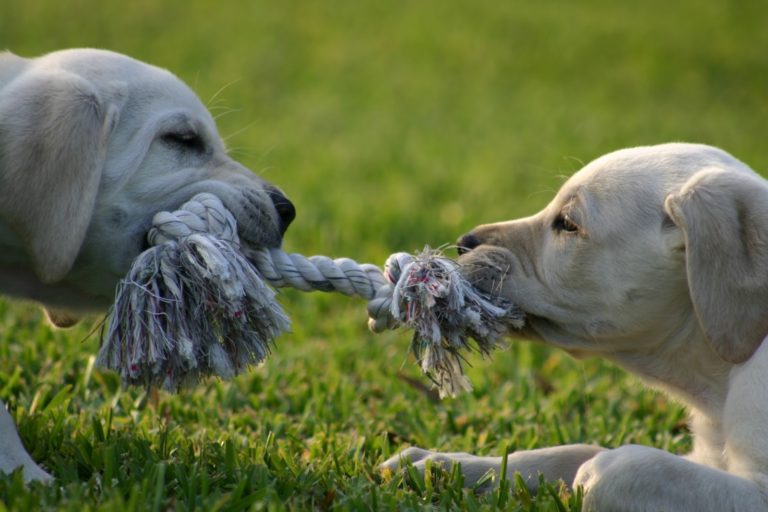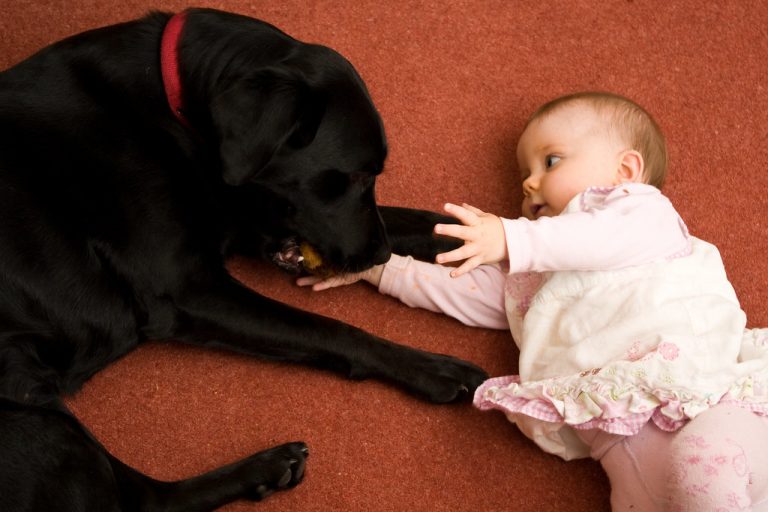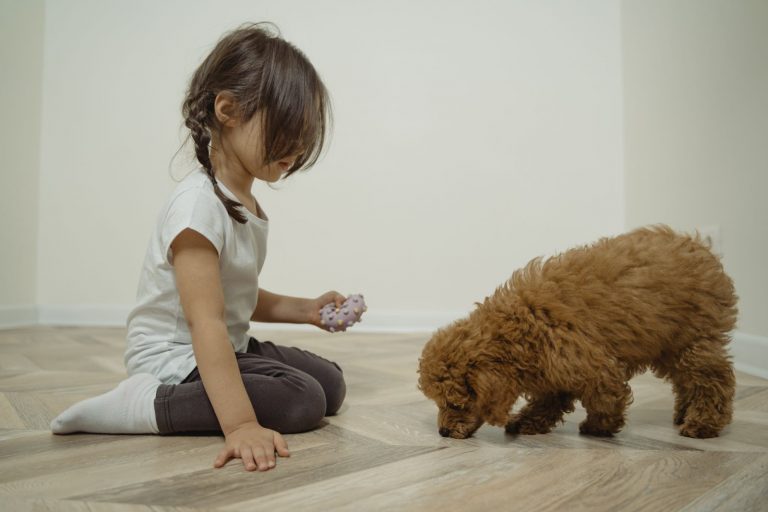Labradors are beloved pets who bring joy and companionship to countless households. However, to ensure they develop into well-behaved and confident dogs, it’s essential to prioritize their socialization from an early age. Early socialization for Labradors refers to the process of introducing them to various people, animals, and environments in a positive and controlled manner. This important aspect of their development can have numerous benefits for their behavior and training.
Labrador puppies are especially receptive to socialization during their critical period between 3 and 14 weeks of age. During this time, they are more adaptable to new experiences and can form positive associations more easily. By exposing them to a range of social situations, owners can help prevent future behavioral issues and promote their confidence and adaptability in different environments.
Key Takeaways:
- Early socialization is essential for Labradors to develop into well-behaved and confident dogs.
- Starting socialization during the critical period between 3 and 14 weeks of age can have numerous benefits for their behavior and training.
- Proper socialization can help prevent future behavioral issues and promote their adaptability and confidence in different environments.
When to Start Socializing Your Labrador Puppy
Labrador puppies are full of energy and curiosity, making them an ideal breed for socialization. The ideal time to begin socializing your Labrador puppy is during their critical period for socialization, which typically falls between 3 and 14 weeks of age. It’s crucial to start early, as socialization during this period has a significant impact on their behavior and development.
During these weeks, puppies are more open and receptive to new experiences and stimuli. This period is also when they begin to form their social skills and develop their understanding of the world around them. Proper socialization during this stage can prevent behavior issues, such as fear and aggression, in the future.
When socializing your Labrador puppy, it’s essential to expose them to a variety of positive social experiences. This includes introducing them to different people, animals, and environments. Positive experiences during socialization can help build their confidence, making them more comfortable in new situations and interactions.
Here are some puppy socialization tips for Labradors:
- Take your puppy on walks and allow them to explore new environments.
- Introduce your puppy to other dogs, both familiar and unfamiliar.
- Expose your puppy to different types of people, including family members, friends, and strangers.
- Allow your puppy to experience new sounds, smells, and sensations.
- Provide positive reinforcement, such as treats and praise, during socialization experiences.
Remember, socialization is an ongoing process. Even after your Labrador puppy’s critical period for socialization has passed, it’s important to continue exposing them to new experiences and interactions. This will help maintain their social skills and prevent regression.
Benefits of Early Socialization for Labradors
Early socialization is crucial for the development of your Labrador’s behavior. It allows them to become well-adjusted and confident dogs, able to interact positively with people and animals alike. By starting socialization at a young age, you can help prevent behavioral issues such as aggression, shyness, and fearfulness.
Socialization also helps your Labrador develop important skills, such as problem-solving, communication, and decision-making. These skills are essential for their growth and will help them navigate their environment with ease.
Early socialization can also promote positive habits and behavior that will benefit your Labrador throughout their life. It helps them to become accustomed to different situations and environments, making them less likely to become anxious or fearful in new situations.
Proper socialization can also improve your Labrador’s interactions with other animals. By introducing them to other dogs and pets in a controlled and positive manner, you can help prevent aggression and encourage friendly play.
In conclusion, early socialization for Labradors is essential for their behavior development. It provides numerous benefits that will benefit them throughout their life, such as confidence, adaptability, and social skills. By prioritizing socialization at a young age, you can help your Labrador become a well-behaved and happy pet.
Socializing Labradors with People
Socializing your Labrador with different types of people is an important aspect of their training and development. It helps them gain confidence, learn proper behavior, and prevent fear or aggression towards unfamiliar individuals.
When socializing your Labrador with people, start with family members and close friends who the puppy is already familiar with. Allow them to interact with the puppy in a calm and positive manner, encouraging gentle play and praise.
As your Labrador becomes more comfortable, gradually introduce them to strangers in controlled environments. Provide treats and positive reinforcement for good behavior and redirect any negative behavior with commands and praise.
It’s also important to expose your Labrador to different types of people, such as children and the elderly. This will help them learn how to interact appropriately with individuals of all ages.
Remember to always supervise interactions and never force your Labrador into uncomfortable situations. With patience and consistency, socializing your Labrador with people can be a positive and rewarding experience for both you and your furry friend.
Socializing Labradors with Other Animals
Socializing Labradors with other animals is an essential aspect of their socialization process. Proper socialization helps to ensure that they develop appropriate communication skills and interact well with other animals. It is important to introduce your Labrador puppy to other animals at a young age to ensure that they grow up to be friendly and confident dogs.
The socialization process should start slowly and gradually, with short and supervised interactions. One of the best ways to socialize Labradors with other animals is to introduce them to dogs that are already well-socialized and trained. This can help to reduce any fear or anxiousness that your puppy may have and help them learn how to play and interact with other dogs.
| Tips for Socializing Labradors with Other Animals |
|---|
| 1. Start Early: Start socializing your Labrador puppy with other animals as early as possible, ideally between 3 and 14 weeks of age. |
| 2. Supervise Interactions: Always supervise interactions between your puppy and other animals to ensure that they are safe and positive. |
| 3. Reward Good Behavior: Reward your puppy with treats and praise when they exhibit good behavior and interact positively with other animals. |
| 4. Introduce Them Gradually: Introduce your puppy to different types of animals slowly and gradually, starting with dogs that are already socialized and trained. |
| 5. Stay Calm: Stay calm when introducing your puppy to other animals. Dogs can sense anxiety and nervousness, which can make them feel anxious or fearful. |
| 6. Be Patient: Be patient and don’t rush the process. Socialization takes time and effort, but it is worth it in the end. |
Remember that every dog is different, and socialization needs can vary. It is essential to observe your dog’s behavior and adjust your training approach accordingly. If your dog shows signs of fear or aggression towards other animals, seek professional help from a certified dog trainer or behaviorist.
Socializing Labradors with Various Environments
Socializing Labradors with different environments is an essential part of their development. By gradually introducing your dog to unfamiliar sounds, sights, and experiences, you can improve their adaptability and reduce their anxiety levels. Here are some tips for socializing your Labrador with various environments:
- Start small: Begin by introducing your Labrador to low-stress environments, such as your backyard or a quiet park. Gradually increase the intensity of the environment over time.
- Expose them to different sounds: Loud noises are often a source of anxiety for dogs. Expose your Labrador to different sounds, such as traffic and construction noise, by playing recordings at a low volume and gradually increasing the volume over time.
- Introduce them to new objects: Expose your Labrador to different objects, such as bicycles and skateboards, to familiarize them with new experiences. Use positive reinforcement and rewards to create positive associations with these objects.
- Take them on car rides: Car rides can be a great way to introduce your Labrador to new environments. Start with short trips and gradually increase the length and intensity of the car ride over time.
- Allow for exploration: Encourage your Labrador to explore new environments on their own terms. Allow them to sniff and investigate new surroundings, providing them with plenty of positive reinforcement along the way.
By following these tips, you can ensure your Labrador is well-rounded and adaptable, comfortable in a variety of different environments. Remember to be patient and consistent when socializing your dog, and always prioritize their safety and well-being.
Socializing Labradors with Positive Reinforcement Training
Labrador socialization involves a lot of training, and positive reinforcement is an effective method to encourage desirable behavior. Positive reinforcement training involves rewarding your dog for good behavior, and it creates positive associations with socialization experiences.
When training your Labrador, use treats, toys, or praise to reward them when they interact positively with people, other animals, or new environments. This method helps your dog to understand what you expect of them and reinforces behaviors that you want your dog to repeat.
It’s important to be consistent when using positive reinforcement training. Rewarding your dog every time they engage in desirable behaviors will encourage them to repeat those behaviors. This method will help to socialize your Labrador correctly and develop their behavioral skills as they mature.
Positive reinforcement training can be used in various situations, such as introducing your dog to new people or animals, grooming, and veterinarian visits. Using positive reinforcement for socialization is more effective than punishment-based training or negative reinforcement as it builds trust and confidence in your pet.
In conclusion, training with positive reinforcement is a valuable tool in Labrador socialization. It encourages positive behavior, strengthens the bond between you and your dog, and helps to shape their behavior in a positive way. Consistency is key, so make sure to use positive reinforcement during socialization and throughout your dog’s life.
Socializing Labradors: Overcoming Challenges
Despite the many benefits of early socialization for Labradors, challenges may arise during the process. It’s important to recognize and address these challenges to ensure your dog receives the best possible socialization experience. Here are some common challenges and strategies for overcoming them:
Lack of Exposure
If your Labrador hasn’t been exposed to a wide variety of people, animals, and environments during the critical socialization period, they may be fearful or anxious in new situations. To overcome this challenge, gradually expose your dog to new experiences in a controlled and positive manner. Start with low-stress situations and build up to more challenging ones as your dog becomes more comfortable.
Fearfulness
If your Labrador exhibits fear towards people or animals, take a step back and assess the situation. Identify the source of the fear and try to address it gradually. Exposure to positive experiences can help your dog overcome fear, but it’s important not to force them into situations that cause severe anxiety.
Aggression
If your Labrador displays aggression towards people or animals, it’s important to seek professional help from a qualified dog trainer or behaviorist. Aggression can be dangerous and should be addressed as soon as possible to prevent harm to others.
Separation Anxiety
If your Labrador exhibits anxiety when separated from you or other family members, it’s important to address this issue before socialization. Gradually expose your dog to brief periods of separation and reward them for calm behavior. Seek professional help if necessary.
By recognizing and addressing these challenges, you can ensure a positive socialization experience for your Labrador. Remember to always prioritize your dog’s safety and well-being, and seek professional help when needed.
Continued Socialization for Adult Labradors
While early socialization is crucial for Labradors, it’s important to remember that socialization should continue throughout their lives. Adult Labradors can still benefit from regular social interaction and exposure to new environments, which can help maintain their social skills and prevent behavioral issues.
One way to continue socializing your adult Labrador is through regular trips to the dog park or playdates with other friendly dogs. This can help maintain their socialization with other animals and reinforce positive interactions.
Introducing your Labrador to new people can also be beneficial, particularly if they haven’t been exposed to a wide range of individuals in the past. Consider having friends or family members come over to your home to meet your dog, or taking your dog to public places where they can interact with others in a controlled environment.
Providing mental stimulation for your Labrador can also aid in their continued socialization and development. Puzzle toys, training sessions, and even obedience classes can provide opportunities for socialization while also keeping your dog’s mind engaged and active.
Remember, the more your adult Labrador is exposed to new experiences, people, and animals, the more comfortable and confident they will become in various situations. This can lead to better behavior and an overall happier and healthier pet.
Socialization Tips for Labradors in Different Situations
As your Labrador grows and develops, they will encounter various situations and environments that require socialization. Here are some tips to help you socialize your Labrador in different scenarios:
Introducing Your Labrador to Children
Socializing your Labrador with children is crucial to prevent fear or aggression towards them. Start by introducing your Labrador to well-behaved children in a controlled environment and always supervise interactions.
- Teach children to approach your Labrador calmly and gently, avoiding sudden movements or loud noises.
- Encourage your Labrador to interact positively with children by rewarding good behavior with treats or praise.
- Slowly increase the level of interaction as your Labrador becomes more comfortable around children.
Handling Vet Visits
Many Labradors may feel uncomfortable or anxious during vet visits. Socializing them to the vet’s office and procedures can make the experience less stressful for both you and your pet.
- Take your Labrador to the vet’s office for short visits where they can interact positively with the staff and receive treats or praise.
- Teach your Labrador basic command cues, such as “sit” or “stay,” to aid the vet during exams or procedures.
- Provide comforting items, such as a favorite toy or blanket, to make your Labrador feel more secure during vet visits.
Interacting with Unfamiliar Dogs
Socializing your Labrador with other dogs is essential to prevent aggression or fear towards them. However, it’s important to introduce them to unfamiliar dogs in a controlled and positive manner.
- Start by introducing your Labrador to a calm and well-socialized dog in a neutral environment, such as a park or backyard.
- Observe your Labrador’s behavior and reward good interactions with treats or praise.
- Gradually increase the level of interaction as your Labrador becomes more comfortable around other dogs.
By socializing your Labrador in various situations, you can ensure they develop into a well-behaved and happy pet. Remember to always supervise interactions and use positive reinforcement to encourage good behavior.
Conclusion
As a Labrador owner, it is essential to prioritize your pet’s socialization from a young age. Early socialization plays a crucial role in developing your dog’s behavior and preventing potential issues in the future. By exposing your Labrador to different environments, people, and animals, you can build their confidence, teach them appropriate social skills, and prevent fear or aggression.
Remember, socialization doesn’t end when your Labrador reaches adulthood. Continual exposure to new experiences and positive reinforcement training can ensure that your pet remains socially adept and mentally stimulated throughout their life.
By following the tips outlined in this article, you can start socializing your Labrador today and set the foundation for a happy and well-behaved companion. Your efforts will pay off in the long run, and you and your Labrador will enjoy a stronger, healthier relationship because of it.
FAQ
Q: What is early socialization for Labradors?
A: Early socialization for Labradors refers to the process of exposing them to a variety of people, animals, and environments at a young age. It helps them develop appropriate social skills, prevent behavioral issues, and become well-rounded and adaptable pets.
Q: When should I start socializing my Labrador puppy?
A: It is recommended to start socializing your Labrador puppy between 3 and 14 weeks of age. This period is crucial for their social development, as they are more open to new experiences and less likely to exhibit fear or aggression.
Q: What are the benefits of early socialization for Labradors?
A: Early socialization has numerous benefits for Labradors. It helps prevent behavioral issues, promotes confidence and positive interactions with people and other animals, and contributes to their overall well-being and happiness.
Q: How do I socialize my Labrador with people?
A: To socialize your Labrador with people, expose them to different individuals, such as family members, friends, and strangers, in a positive and controlled manner. Encourage gentle interactions, provide rewards for good behavior, and gradually increase exposure to various types of people.
Q: How do I socialize my Labrador with other animals?
A: Socializing your Labrador with other animals involves introducing them to dogs and smaller pets in a controlled and positive manner. Start with supervised interactions, reward calm behavior, and gradually expose them to different animals while monitoring their reactions.
Q: Why is it important to expose Labradors to various environments?
A: Exposing Labradors to various environments helps them become adaptable and less prone to anxiety or fearfulness. Gradually introduce them to new places, sounds, and experiences, ensuring they feel safe and providing positive reinforcement for their calm and confident behavior.
Q: How does positive reinforcement training contribute to socialization?
A: Positive reinforcement training plays a crucial role in Labrador socialization. By using rewards, treats, and praise, you can encourage desired behavior during socialization experiences. This creates positive associations and reinforces good social skills and interactions.
Q: How can I overcome challenges in Labrador socialization?
A: Common challenges in Labrador socialization, such as fearfulness, aggression, and separation anxiety, can be overcome with patience and proper training. Consult with a professional trainer if needed and implement appropriate strategies to address these issues effectively.
Q: Is socialization important for adult Labradors?
A: Yes, socialization is important for adult Labradors. Continued social interactions and mental stimulation help maintain their social skills and prevent regression. Regular exposure to new experiences and positive interactions with people and animals are beneficial for their overall well-being.
Q: What are some socialization tips for Labradors in different situations?
A: When socializing Labradors in different situations, such as introducing them to children, handling visits to the veterinarian, or interacting with unfamiliar dogs, it is important to go at their pace and provide positive experiences. Use treats and rewards, supervise interactions, and seek professional guidance if needed.








